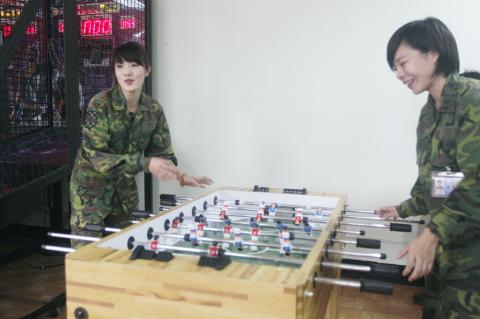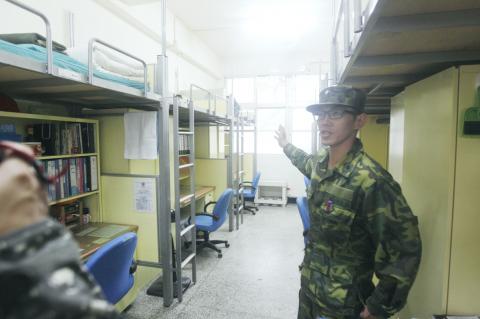The army on Monday introduced new initiatives at its military facilities that allow soldiers to use smartphones, browse the Internet in their free time and enjoy improved accommodation, in a bid to boost lower-than-expected enlistment figures.
During a media tour at a base in Pingtung County, the army showed off new soldiers’ quarters, which include air conditioning and desks for individual soldiers. In the past, soldiers had only beds and lockers.
The 333rd Brigade at the base in Pingtung is among 35 military units that have been chosen by the army to improve soldiers’ quality of life through the inclusion of certain creature comforts.

Photo: CNA
Staff Sergeant Lu Shu-hao (呂書豪) said the barracks had improved drastically on the quarters he had lived in previously.
“It’s like 500 times cooler than before,” he said.
Lu belongs to an experimental company made up entirely of enlisted soldiers in the army’s 333rd Brigade.

Photo: CNA
Meeting reporters on a base tour, Lu cited improvements in comfort, atmosphere and hygiene, which he said make the barracks “no longer look like a cheap hotel.”
To increase the appeal of being part of an all-volunteer force, a goal set for 2017, the military has taken steps to improve the living conditions of service members, in addition to paying higher salaries.
Taking shower facilities as an example, Lu said soldiers in his company can now use separate cubicles instead of the open bath commonly seen in army barracks. To be able to relax is very important after a day of drills and exercising, he added.
Other improvements include individual bunks, desks and closets, and perhaps more important for modern young people: The right to use smartphones.
In order to join the army, Lu gave up his US citizenship, saying it was the most important and the best decision he has made in his life so far.
Private Cheng Kai-yang also gave a thumbs-up for the improvements at the base, particularly new initiatives that include allowing military personnel to live off-base and eat outside on work days.
Being able to use smartphones at the base also allows them to stay connected with the rest of the world, Cheng said.
“I believe this will attract more young people to enlist,” he added.
According to the army, 80 percent of the military personnel at the selected 35 units have expressed satisfaction with the improved daily facilities and new measures.
The army began implementing the initiatives in October last year and over the past three months, 10 percent of the young men who are required to undergo four months of military training as part of the military’s plan to shift to an all-volunteer force agreed to enlist.
The army said it is planning to implement the new initiatives at more of its military units. In the 35 units, those who have volunteered to sign up for longer military service increased from 45.3 percent to 56.1 percent, according to the military.
The transition to an all-volunteer army was originally planned for next year, but the army pushed the date back due to lower-than-expected recruitment figures.

Taiwan is stepping up plans to create self-sufficient supply chains for combat drones and increase foreign orders from the US to counter China’s numerical superiority, a defense official said on Saturday. Commenting on condition of anonymity, the official said the nation’s armed forces are in agreement with US Admiral Samuel Paparo’s assessment that Taiwan’s military must be prepared to turn the nation’s waters into a “hellscape” for the Chinese People’s Liberation Army (PLA). Paparo, the commander of the US Indo-Pacific Command, reiterated the concept during a Congressional hearing in Washington on Wednesday. He first coined the term in a security conference last

DEFENSE: The National Security Bureau promised to expand communication and intelligence cooperation with global partners and enhance its strategic analytical skills China has not only increased military exercises and “gray zone” tactics against Taiwan this year, but also continues to recruit military personnel for espionage, the National Security Bureau (NSB) said yesterday in a report to the Legislative Yuan. The bureau submitted the report ahead of NSB Director-General Tsai Ming-yen’s (蔡明彥) appearance before the Foreign and National Defense Committee today. Last year, the Chinese People’s Liberation Army (PLA) conducted “Joint Sword-2024A and B” military exercises targeting Taiwan and carried out 40 combat readiness patrols, the bureau said. In addition, Chinese military aircraft entered Taiwan’s airspace 3,070 times last year, up about

A magnitude 4.3 earthquake struck eastern Taiwan's Hualien County at 8:31am today, according to the Central Weather Administration (CWA). The epicenter of the temblor was located in Hualien County, about 70.3 kilometers south southwest of Hualien County Hall, at a depth of 23.2km, according to the administration. There were no immediate reports of damage resulting from the quake. The earthquake's intensity, which gauges the actual effect of a temblor, was highest in Taitung County, where it measured 3 on Taiwan's 7-tier intensity scale. The quake also measured an intensity of 2 in Hualien and Nantou counties, the CWA said.

The Overseas Community Affairs Council (OCAC) yesterday announced a fundraising campaign to support survivors of the magnitude 7.7 earthquake that struck Myanmar on March 28, with two prayer events scheduled in Taipei and Taichung later this week. “While initial rescue operations have concluded [in Myanmar], many survivors are now facing increasingly difficult living conditions,” OCAC Minister Hsu Chia-ching (徐佳青) told a news conference in Taipei. The fundraising campaign, which runs through May 31, is focused on supporting the reconstruction of damaged overseas compatriot schools, assisting students from Myanmar in Taiwan, and providing essential items, such as drinking water, food and medical supplies,